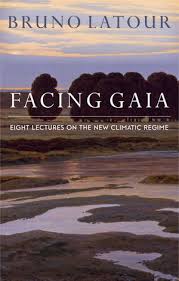
Hesiod’s Theogony recounts the genesis of Gaia as the Earth, a feminised primordial deity who simultaneously emerges with Eros and Tartarus out of the antecedent void of Chaos to become ‘the ever-sure foundations of the deathless ones who hold the peaks of snowy Olympus’. Gaia proceeds to create her equal, the ‘starry Heaven’, and from their consummation are descended numerous other deities. From thence is made possible the proliferation of mortal life on her surface.
As the progenitor of that which exists, Gaia is unmistakably active and dangerous. Indeed, James Lovelock resurrected the concept of Gaia to illustrate, contrary to the original myth, not a gigantic organism or compassionate deity, but rather a self-regulating system composed of a multiplicity of indivisible elements that evolve through mutual modification. Hardly a passive incubator for the technological fancies of the human intellect, the earth transformed by the human mind, as Paul Valéry once pointed out, is today ‘repaying us in kind’. It reciprocates with disaster.
Climatic catastrophe — along with the planetary depletion of resources to fuel it — shatters the dream of continual progress supposedly vouchsafed by liberal humanism. The anthropogenic world has already betrayed the ideational ineptitude of the human mind, its moral sightlessness. Some have even managed to turn climate change into a ‘debate’ that conveniently postulates the existence of two ‘sides’ whose voices must both, for the sake of fair-mindedness, be heard. The victory of the denialists is ensured as soon as they convince people that there is a scientific ‘debate’ still to be had, which suggests the inexistence of sufficient evidence either way. The realisation of our insecurity, our planetary precariousness, is clearly incongruous with our modern, narcissistic distemper. Only through denial can the mind discern a ‘rational’ design in what it has produced.
Facing Gaia: Eight Lectures on the New Climatic Regime constitutes an extended reworking of Bruno Latour’s 2013 Gifford lectures delivered at Edinburgh University. Latour’s intention is to take up this conception in pursuit of a new way of thinking about our critical moment. He expressly emphasises that Gaia is a secular figure for the earth: a ‘name proposed for all the intermingled and unpredictable consequences of the agents, each of which is pursuing its own interest’. It is, as he termed it in his original lectures, ‘an entity composed of multiple, reciprocally linked, but ungoverned self-advancing processes’. Not ‘a kindly figure of unification’, it does not denote the existence of a ‘higher system than the life forms it manipulates’ since it isn’t itself something unified. It doesn’t offer the possibility of a global view, but a partial, terrestrial one. As opposed to the ‘old nature’, Gaia ‘does not play either the role of inert object that could be appropriated or the role of higher arbiter’.
St
‘Gaia’ seems a misty notion — a nominal non-entity, if you will — that verges not only towards the obvious, but also, in its vast generality, towards the erroneous. Its content is so variegated, so heterogeneous, so interconnected, so inextricable, that one wonders if it offers anything beyond the further ‘post-human’ redistribution of agency it entails. The desire for complete submersion — ‘to slip into, envelop ourselves within, a large number of loops’ — perhaps explains Latour’s meandering prose. Frequently suffering from word bloat, one often longs for him to get to the point; although, in a resolutely flat ontology, there cannot be any ‘point’, ‘whole’, or ‘centre’ that one could scale. Everything reduces to an endless loop. Hence, Latour’s philosophy of the pretzel offers only the conundrum of entanglement without exit, especially given that critique has apparently ‘run out of steam’. There is no way to escape the network in which one is forced to play a part.
Latour has perhaps belaboured Gaia more than it warrants, especially if it amounts only to a ‘signal telling us to come back to Earth’. On the other hand, we surely need such signals since the Kantian need for thinking to orient itself has rarely been more urgent. The difficulty of this task is today increased all the more since we occupy not an inert, unobtrusive backdrop in which or against which we may orient ourselves, as we thought we did with Nature, but instead partake in a shared life on a volatile earth that confounds our attempts to manage it. Hence the recent invention of mind-altering conceptions (the Anthropocene, Gaia, the Chthulucene, etc) of varying merit to which we now have recourse in order to understand this ‘new climatic regime’ without resorting to the usual dichotomies.
Whether this intellectual labour will help avert environmental cataclysm remains to be seen. For the ecological catastrophe is clearly contiguous with a human crisis: a profound perturbation of our politics, of our epistemology, of our ethics. This global technosphere powered by the fossil economy has proven perversely inimical to life. It may finally prove fatal, since the actions undertaken to ameliorate planetary exploitation are belated, and will now likely prove insufficient. It is only sensible to wonder whether Latour’s ‘Earthbound’ can ever prevail against the recalcitrant convictions of the ‘Moderns’, or the political connivance of their most devout apologists, the climate sceptics: those whose continued occupation of Nature leaves them all too dangerously Human.
No comments:
Post a Comment